Remi Bader's Bud Light moment
When audiences see content creators as brands, a pivot feels like a betrayal
The online firestorm that’s greeted fashion creator Remi Bader’s body transformation has confirmed a shift that’s been brewing for some time...
Audiences do not see content creators as people. They view them as brands. And they think of themselves as a shareholder in that brand.
As one commenter bluntly put it:
And when the product changes, or when it stops being relatable, expect a Bud Light-style revolt. And that’s exactly what happened to Bader, 30, after she quietly lost 140 pounds, and with that stopped being the plus-sized icon that made her an online star.
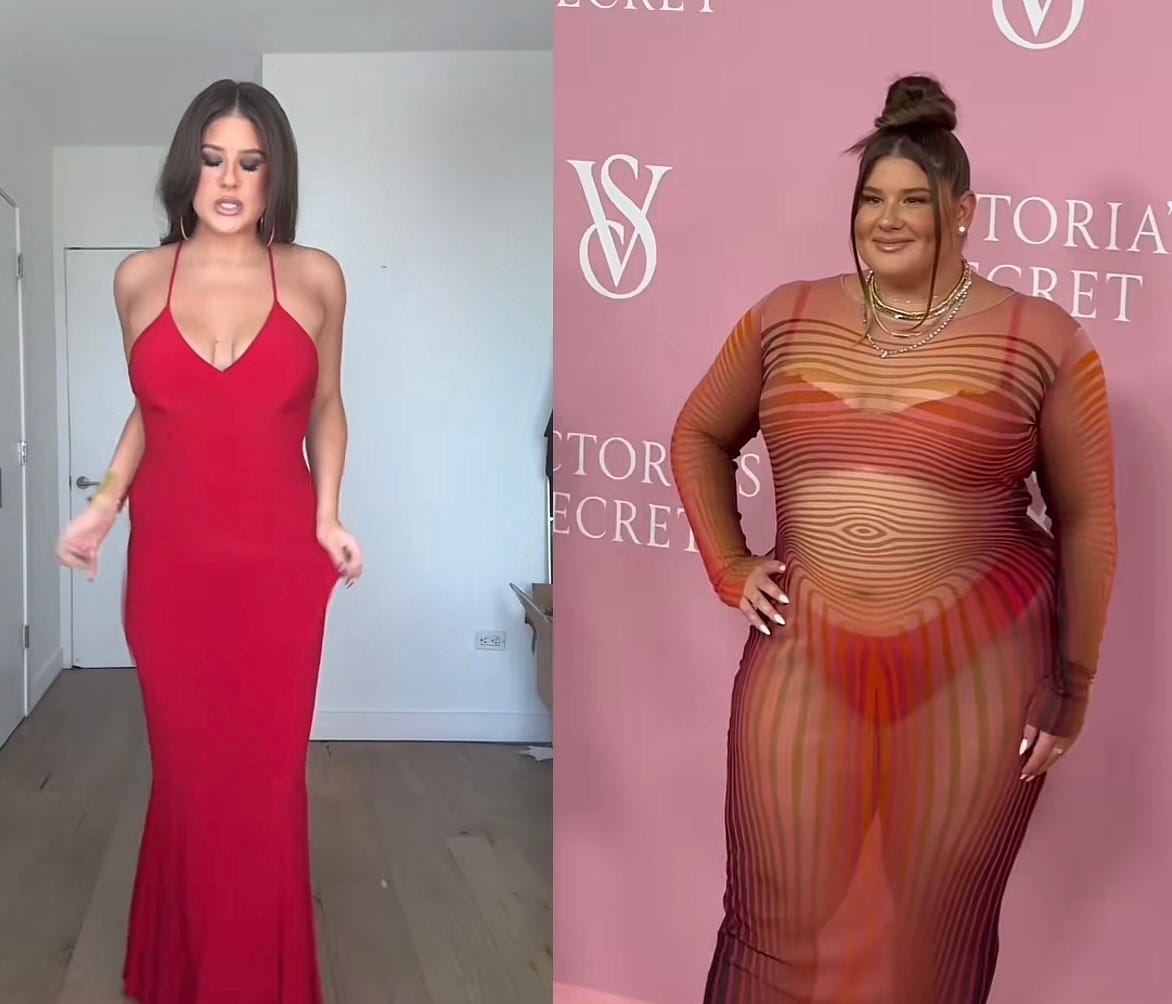
Bader’s story starts in 2020 when videos of her recreating celebrity outfits “in a size 16” caught fire on TikTok. She then made her name by filming ”realistic” shopping haul try ons to show what clothes really looked like on a regular shopper’s body.
She playfully recreated the absurd poses models adopt on retailer websites and wasn’t afraid to make fun of herself as she tried on pieces that hadn’t been designed for her curves, creating instant connections with women of all shapes and sizes who’ve had a soul-crushing experience in a fitting room.
In more serious moments Bader critiqued the inconsistent sizing of clothing brands, praised inclusive fashion shows and called out stores that didn't stock her size.
Bader’s following quickly grew and she was soon invited to influencer events, bagging brand deals and producing sponsored content.
Then in 2024, Bader, who made no secret of her unhappiness with her body, started to noticeably lose weight. When some of her two million followers asked questions or made comments she reportedly blocked them.
Bader didn't address her transformation on TikTok. Instead at the end of last month she sat down with Khloe Kardashian to record a podcast and gave a tell-all interview with SELF magazine.
With her ‘secret’ finally out - Bader had surgery to shrink her stomach by 80 per cent - she faced a barrage of criticism from followers. Their gripes included that:
Bader ‘lied’ to them for over a year by not revealing that she’d had a procedure
She created a platform, and made money, by making relatable content about being “plus sized” then turned her back on the fans who helped make her a star
Bader’s content led viewers to believe her slimmer body was the result of exercise
By blocking fans who guessed or questioned how she was losing weight, she “gaslit” them
She compounded her missteps by picking Khloe Kardashian, who’s been slated for promoting unhealthy diet culture, as the person to share her story with
Many of Bader’s critics seem to have either missed, or are choosing to disregard, that in September 2023 she posted a tearful video saying that after being bombarded with body shaming comments she wouldn't be sharing any information about her weight going forward.
“My health journey will now be my business,” she said. “What I chose to do whether that’s gain or lose weight, the medications I take, supplements I take, my workout routine, whatever it is I’m not going to share.”
Bader’s warning and expectation setting did little to counter how entitled some of her followers felt when it came to being kept in the loop on her life. Their reaction to her transformation is not only a case study on the pitfalls of parasocial relationships but also exposes how audiences see content creators as something they have a right to consume because they’ve invested in them…
Alongside Bader’s new look came a different content offering too. Out went the try-ons and instead Bader showed followers her outfits overlayed with music. The change felt as shocking to fans as Coke changing its recipe.
A common refrain from Bader’s critics is that they aren’t mad that she lost weight, it’s that she didn’t take followers on the journey with her. So, could Bader have avoided the onslaught if she’d just been more transparent? Maybe. But Connor Hubbard’s experience tells a different story.
Known as hubs.life on TikTok, Hubbard built a following of nearly one million by posting his “normalize the norm” videos that documented his life as a Texas-based 9-5 office worker. While his videos are stylistically shot and skilfully edited they’re ultimately timestamped chronicles of mundanity.
Hubbard ended up in the crosshairs of his followers after he became so successful at making TikToks about his normal life he ended up with an extraordinary one because he attracted so many brand deals.
In February he announced he was quitting his corporate job to create content full time and to spend more time with his young family. He held his followers’ hands as he explained that for the last two years he’d worked full time as well as spending hours every day shooting and editing TikToks.
But even this level of transparency didn't satisfy everyone. Some of the most popular comments on his final corporate 9-5 video proved that he too had fallen into the relatability trap.
Even if Bader had shared every aspect of her journey it’s likely that she would have faced the same fate. The clothes she used to struggle to fit into now slide on with ease. The USP she established five years ago has fundamentally shifted.
Her strategy may have changed too. She posted her first “talking video” since the drama erupted on Instagram earlier this week, where she has significantly fewer followers than TikTok.
In the video she seems defeated as she stands in a bikini to debunk rumours of skin removal surgery, showed viewers her scars and said she didn’t want to be a “surgery advocate”.
While I sympathise with the audiences who feel duped by a creator’s evolution I also think it’s sad that Bader and Hubbard found themselves stuck in gilded cages after chasing their dreams. Them having to deal with so much negativity once they found success just doesn’t sit right.
The lessons from both sides are plentiful. For audiences it’s clear that becoming overly invested in an online persona will likely end in disappointment. Very few people can be as consistent as Coca-Cola.
For creators, they need to be careful what they wish for. Not everyone will congratulate them when they reach their goals. And on a more practical point, if they want to safeguard themselves from backlash they need to stay relatable, be as transparent as glass and pivot at their peril.
Do you think creators should be able to evolve without enraging their followers? Or did Remi and Connor bait and switch their fans? Share your thoughts in the comments.
highly flammable is produced and written by me, Rachel Richardson
I’m a content creator, commentator and consultant at Beginning, Middle and End
Want more? Check out Threads, Twitter/X and Instagram. I’m also dabbling in some Bluesky thinking.
Email rr@bmend.com




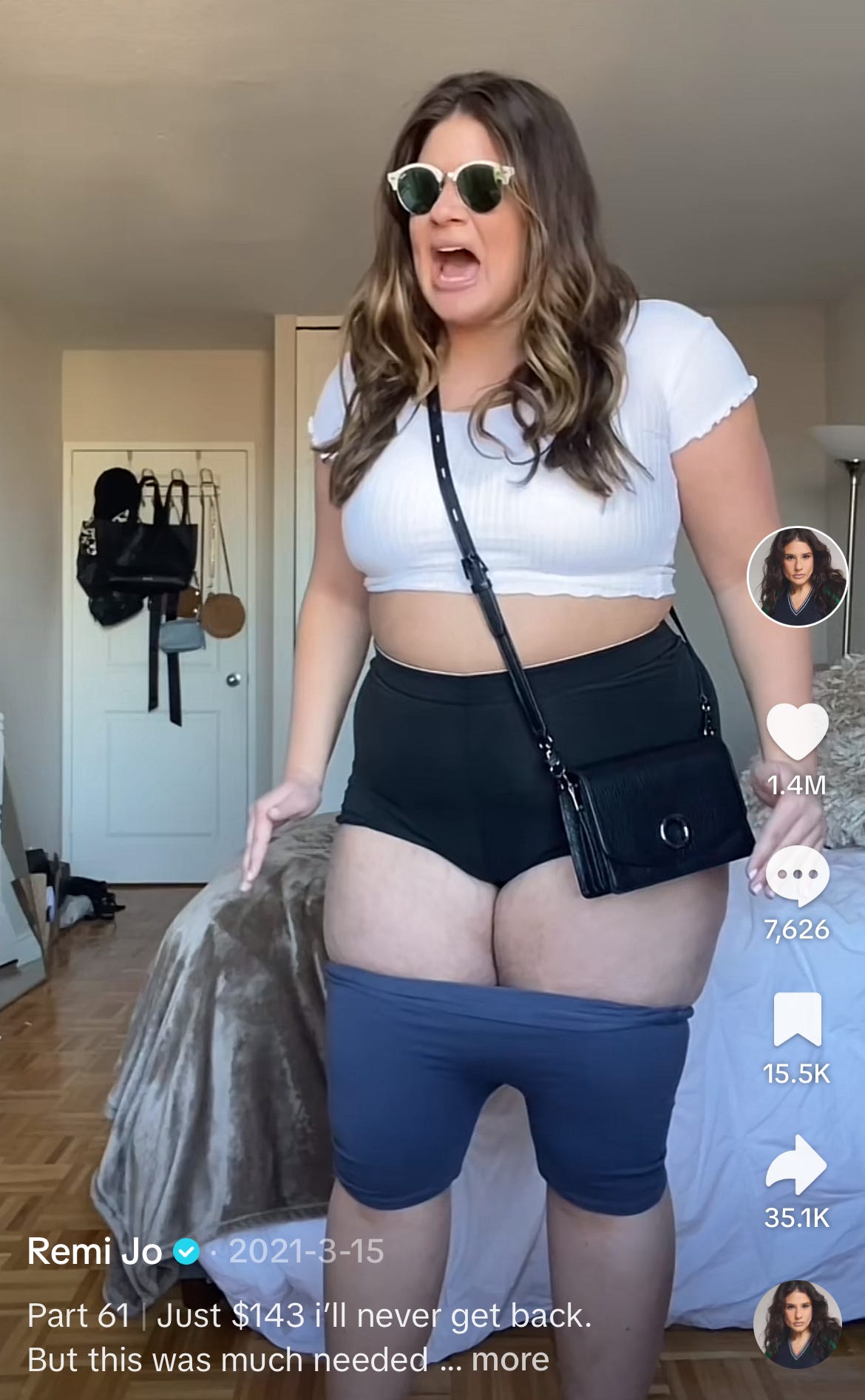

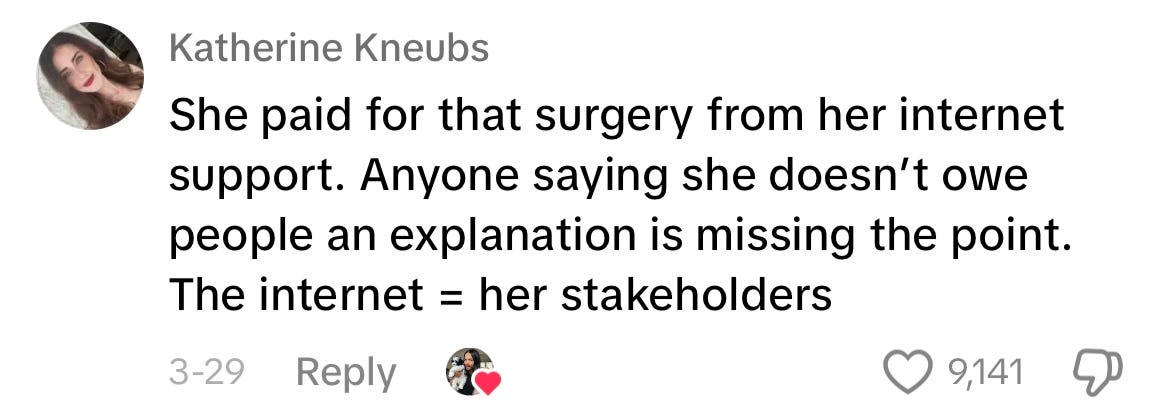
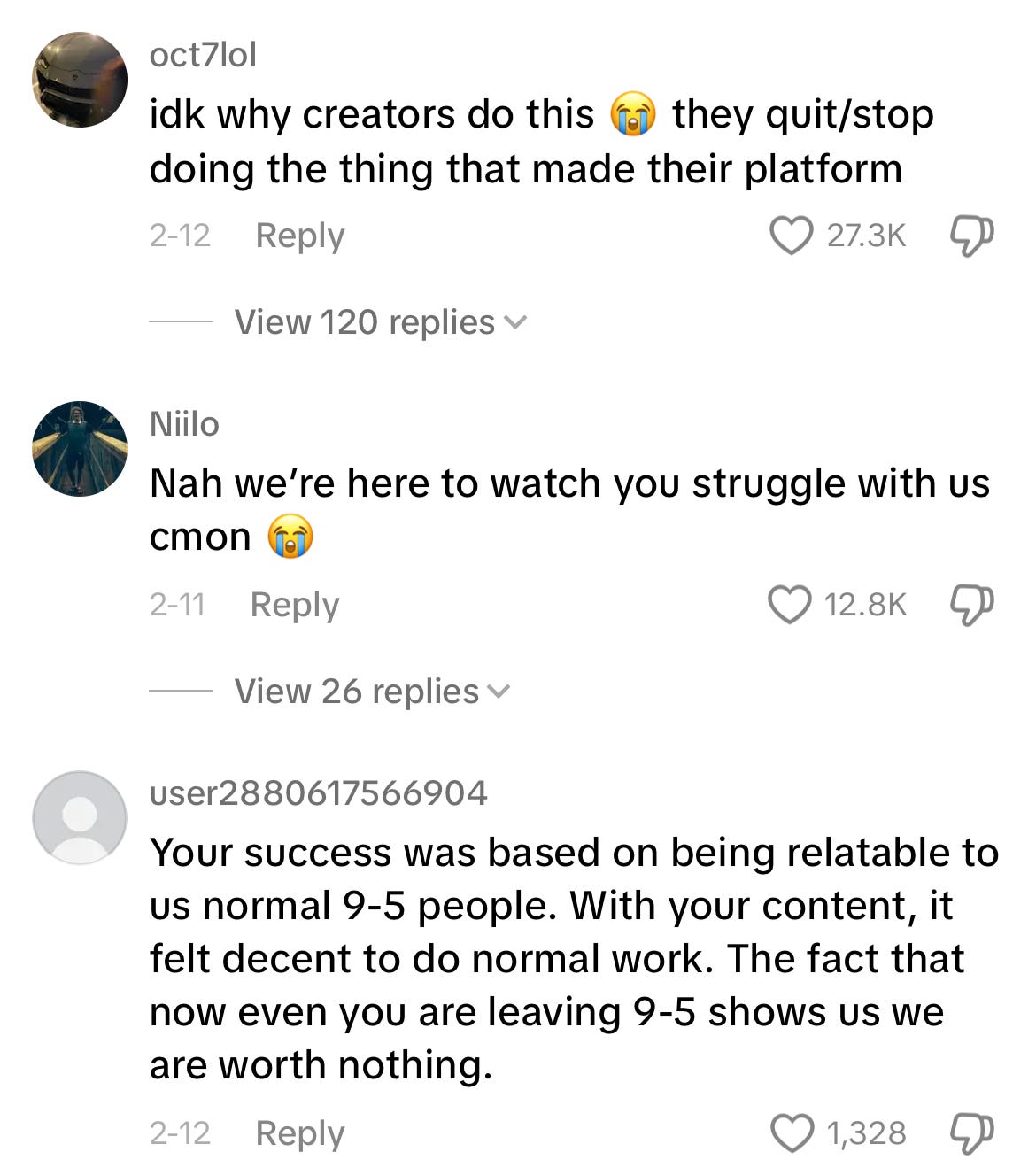
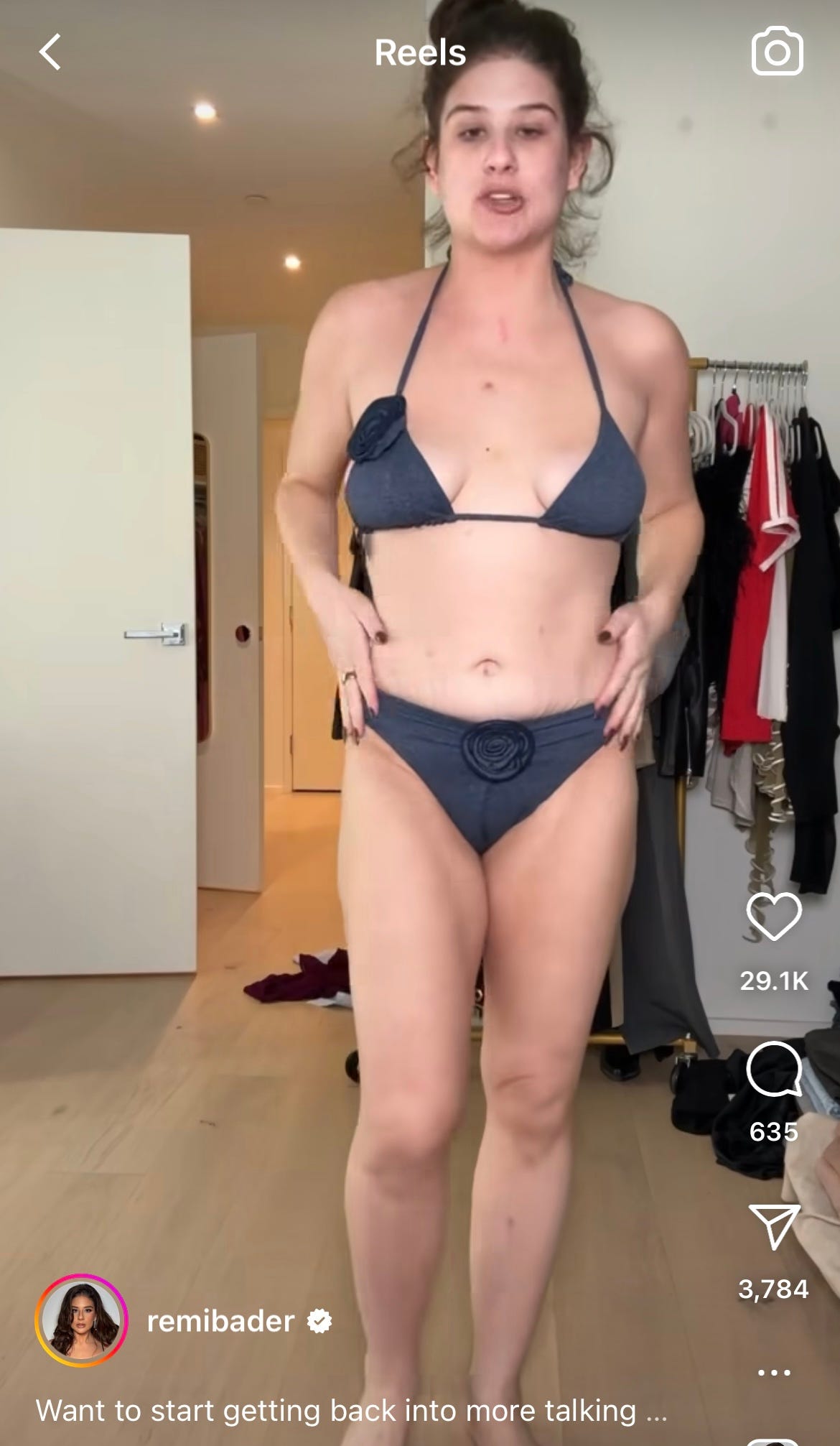
Oh my god this is so good - wtf?? That internet followers = stakeholders comment will stay with me forever, so bleak
I wouldn't call this Remi's "Bud Light moment" because Dylan was getting (and still does) and insane amount of hate and also death threats.
Audiences are not entitled to any private details of a creator's life, but when creators are constantly sharing everything without a filter and then suddenly say "actually it's none of your business" I understand that their audience will have a reaction to that. I also don't think Remi's and this other guy's situation can be compared. Remi started her account based on the premise that she is not happy with her body and also that she cannot wear the clothes she wants to because they don't make them in her size. Taking her audience on her weight loss journey (ugh I hate the word journey lol) would have been a very natural direction for her content.
This guy started an account about the mundanity of his office job. His audience was following him to see that, and not because they were interested in him as a person (I'm sorry of this is harsh). It happens very often that a creator becomes unrelatable because they get an influx of followers and brand deals. I don't follow him, so I don't know if he took a smart approach to transitioning his content so his audience connects more with him as a person instead of his specific niche content, but at the end of the day, it's not what their followers started following him for. If I start watching a series, and then suddenly the new season is a completely different genre, I will also stop watching.